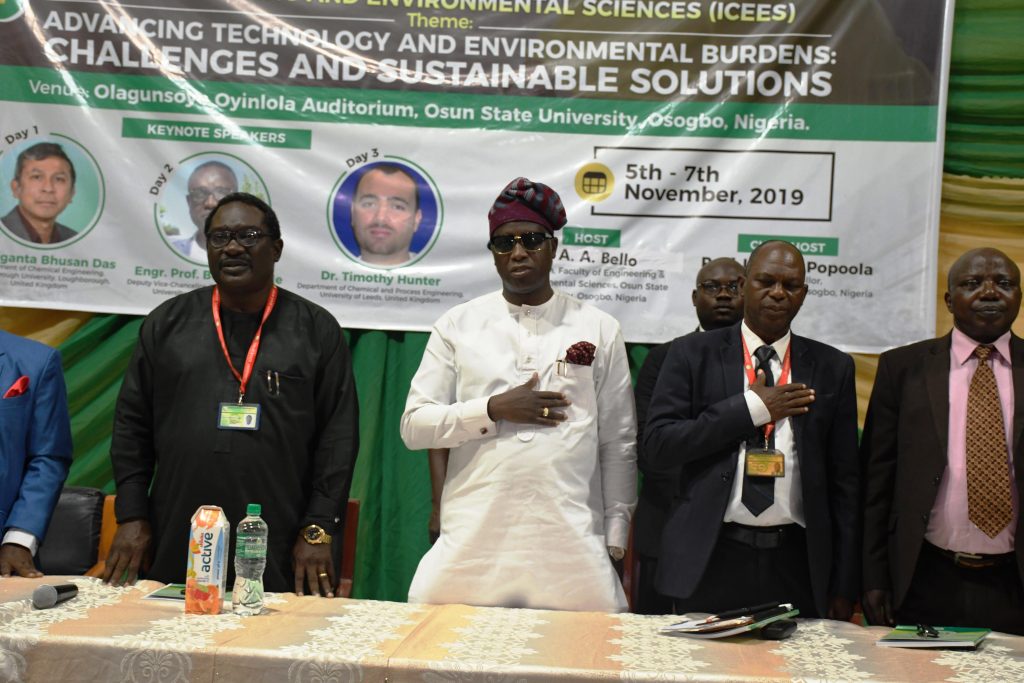…As UNIOSUN hosts 1st international Conference on Engineering and Environmental Sciences
BY DAYO ADESULU
Osun State Governor, Mr Isiaka Ggboyega Oyetola and traditional rulers in the state of Osun, have called on the different legislative arms of government in the country to enact laws against environmental degradation.
The call was made at the first international conference of the Faculty of Engineering and Environmental Sciences of the Osun State University, Osogbo themed “Advancing Technology and Environmental Burdens: Challenges and Sustainable Solutions”
The Governor who was represented by his deputy, Mr Benedict Gboyega Alabi said the legislative arms need to enact laws that will mandate industries and new homes to start switching to renewable energy instead of fossil fuels.
The Governor who spoke on the topic, “Political Response to Climate Change and Environmental Degradation”, said collective and innovative actions are needed by the federal and state legislative arms to protect the environment.
Alabi said degrading the environment constitute a great danger to the survival of not just humans, but the entire habitat.
He said, “Every stakeholder must be concerned about the challenges posed by climate change and environmental degradation. It is a challenge on our habitat, on our survival as a human race and also a challenge on peace and our community life.
”Climate change has become a global reality. It comes with deluge of effects and consequences which include excessive and heavy downpour, heat waves, Ozone layer depletion, acid rain incidents, extended forest fire, melting ice, rise in sea level coupled with excessive flooding, erosion and many more catastrophic events.
READ ALSO: UNIOSUN Introduces Startup Fund For Entrepreneurial Graduates
”Legislative arms need to pass bills that will mandate industries and new homes to start switching to green energy instead of fossil fuels.
We need to implement policies to limit the importation of non-green technologies for use in government offices, institutions and public schools.
”More engagement with civic societies like NGOs, institutions, schools on raising awareness and inspiration for individual actions and innovative solutions”.
He also called on researchers and institutions to partner with government to invent machines, processes, procedures and policies that would aid the government and the public to overcome challenges of climate change and environmental degradation.
He lauded the president for the establishment of relevant agencies and inter-governmental collaborations among nations which he described as the first step in tackling the menace of climate change and environmental degradation.
According to him, the Federal Government has already created Department of Climate change under the ministry of environment. Also, National Emergency Management Agency (NEMA) is actively engaged in the mitigation of the climate consequences.
Dr Diganta Bhusan Das, of Loughborough University, delivered the Keynote address titled: ‘Smart technologies to optimize resources and minimize environmental degradation arising from Industrial/Engineering Development: Recommendations for the Developing nations’
Dr Das pointed out some smart ways to combat climate change. He said it is by employing technological way or idea to monitor stored CO2 in the geological reservoir.
He opined that various techniques can be deployed to tackle climate change and make the environment habitable for the population.
Also, speaking, the Deputy Vice-Chancellor of the University of Ilorin, Prof Bolaji Suleiman reiterated the need to promote green technologies above harmful ones.
He advocated the use of electric cars, eco-friendly and innovative food packaging techniques for prolonged shelf-life of foods, sanctioning of water pollution practices from industries and households.
Dr Timothy Hunter from the University of Leeds also delivered a speech at the conference on smart technologies and simulation techniques for the treatment of water and wastewater resources.
He listed the strengths and limitations of anionic polyelectrolytes in the gravity separation of particulates present in water.
He listed “hindered settling functions” and how it can be incorporated into Computational Fluid Dynamics (CFD) to predict sedimentation of particulates in water flow.
He mentioned that his team had successfully tested in situ acoustic array to give real-time dynamic concentration of pollutants in contaminated water.
The conference was capped by the roles of traditional institutions in tackling the menace of climate change and environmental degradation.
In attendance were the Aragbiji of Iragbiji, Olororuwo of Ororuwo, Akinrun of Ikirun and Elende of Eko Ende. The lead paper was presented by Aragbiji of Iragbiji. He said his kingdom plants six to seven thousand trees every year in order to combat climate change. He reiterated the efforts of his kingdom in protecting the environment.
The session was facilitated by Hon Tunde Olatunji, the chief whip of Osun state house of assembly.
